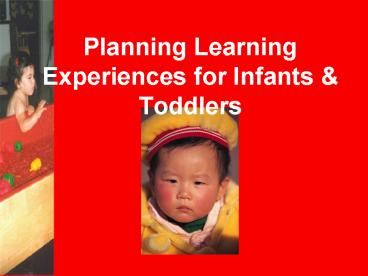Planning Learning Experiences for Infants - PowerPoint PPT Presentation
1 / 16
Title:
Planning Learning Experiences for Infants
Description:
Everything an infant or toddler does during the day is curriculum. ... Snuggle with Baby. Planning Simple Learning Activities Based on Characteristics ... – PowerPoint PPT presentation
Number of Views:20
Avg rating:3.0/5.0
Title: Planning Learning Experiences for Infants
1
Planning Learning Experiences for Infants
Toddlers
2
Curriculum for Infants Toddlers
- Everything an infant or toddler does during the
day is curriculum. - Curriculum is the content of what we teach.
- Practices are the methods we use to teach the
content.
3
Curriculum for Infants Toddlers
- The process of educaring with infants toddlers
looks like this
4
Curriculum for Infants Toddlers
- Typically, parent-teacher communication
influences all aspects of planning,
implementation, and assessment in significant
ways.
5
Curriculum for Infants Toddlers
- Effective curriculum implementation is
- Responsive and individualized
- Adults continuously adjust to meet learning needs
of small groups and individuals. - minutes,
- hours,
- days,
- and weeks.
6
Curriculum for Infants Toddlers
- Environmentally-based
- The environment is rich with opportunities to
explore enjoy.
7
Curriculum for Infants Toddlers
- Flexible and open-ended
- Planning quickly changes as needs change.
- Materials allow for choices unique learning
experiences.
8
Curriculum for Infants Toddlers
- Relationship-based
- The learning is only as good as the relationship
between adult and child. - Utilizes primary care, small groups, and
continuity of care to maintain relationships.
9
Planning Simple Learning Activities Based on
Characteristics
- Identify a characteristic or emerging interest of
the child. - The newborn is adjusting to life outside of the
womb. - Think about the general needs of the child
related to this characteristic. - warmth (unable to adequately regulate own body
temperature) - love and nurturing (trust vs. mistrust)
10
Planning Simple Learning Activities Based on
Characteristics
- Brainstorm some general activities that you can
do with the child. - Wrap Baby warmly
- Hold closely
- Handle slowly
- Snuggle with Baby
11
Planning Simple Learning Activities Based on
Characteristics
- Brainstorm some general activities. Decide on a
specific activity. Plan it. - Swaddle the Baby
- In a group setting you would develop an activity
plan. - Reflect on how the activity went.
- Were Baby's needs met by my activity?
- What might I do differently next time?
12
Assessment of Learning in Infant Toddler
Programs
- The plan-do-review cycle quickly breaks down when
adults ignore the importance of assessment. - Activities become less relevant and more and more
inappropriate to the individual children. - Sometimes, if an adult uses quality resources the
activities are age-appropriate but not
individually-appropriate.
13
Assessment of Learning in Infant Toddler
Programs
- There are three types of assessment.
- Assessment of individual activities learning
- Assessment of children and their development
- Assessment of curriculum or program effectiveness
14
Assessment of Individual Activities Learning
- Adults determine if their goals for learning were
accomplished at the end of an activity. - Adults adjust future activities.
- Adults can also determine the emerging interests
of the children. - A typical tool is anecdotal observations.
15
Assessment of Children their Development
- Monitoring development
- helps determine whether intervention is needed
- helps the adult in planning appropriate
activities and experiences - Typical tools include
- developmental checklists
- informal formal discussions with others who
know child - observations.
16
Assessment of Curriculum or Program Effectiveness
- Does the curriculum do what it is intended to do?
- Programs should be formally evaluated annually
- Outside professionals
- Formal assessment tools































